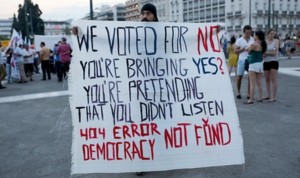Greece, Europe, Undemocracy
[vimeo]https://vimeo.com/136378322[/vimeo]
This film is a chapter from the forthcoming feature documentary, Money Puzzles, a film about money, debt and the fight against austerity. Money Puzzles is conceived as a follow up to the filmmakers’ award winning film, Secret City. Whereas Secret City investigated a crucial institutional structure that was invisible to most and shrouded in secrecy, Money Puzzles focuses on an everyday commodity the reality of which is hidden in plain sight.
Nowhere is the reality of debt money more evident than in Greece right now. The tussles over the so-called bailout shone a light upon the institutional structures that underpin money and its relations. Yet that light seems to have blinded journalists from the mainstream media and their political counterparts.
 Since getting back from Athens, we’ve been hard at work editing the next episode of ‘
Since getting back from Athens, we’ve been hard at work editing the next episode of ‘